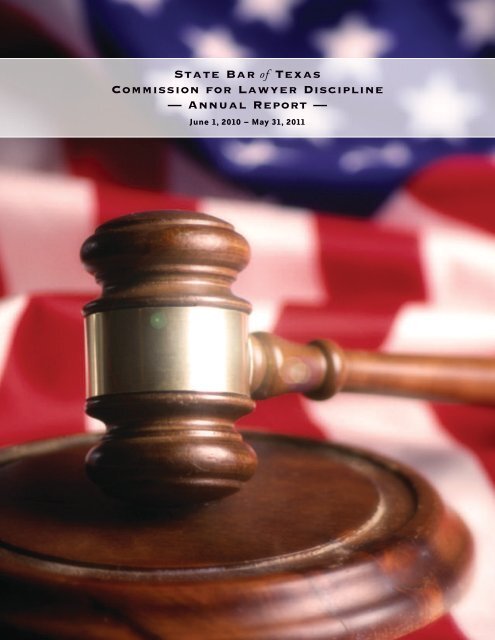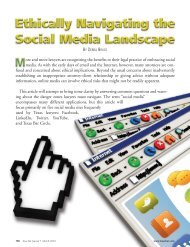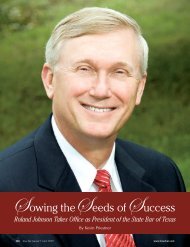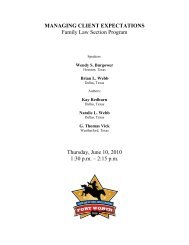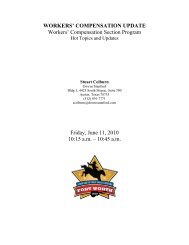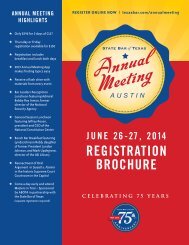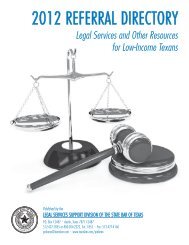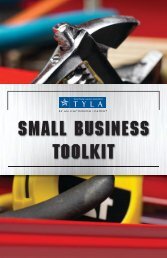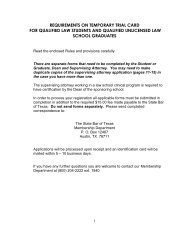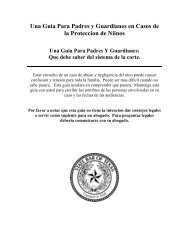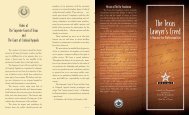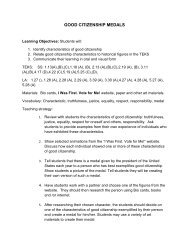Commission for Lawyer Discipline - State Bar of Texas
Commission for Lawyer Discipline - State Bar of Texas
Commission for Lawyer Discipline - State Bar of Texas
- No tags were found...
You also want an ePaper? Increase the reach of your titles
YUMPU automatically turns print PDFs into web optimized ePapers that Google loves.
<strong>State</strong> <strong>Bar</strong> <strong>of</strong> <strong>Texas</strong><strong>Commission</strong> <strong>for</strong> <strong>Lawyer</strong> <strong>Discipline</strong>— Annual Report —June 1, 2010 – May 31, 2011
The <strong>Lawyer</strong>’s Oath“On my oath I will supportthe constitutions <strong>of</strong> the United <strong>State</strong>sand <strong>of</strong> this stateand will honestly demean myselfin the practice <strong>of</strong> lawand will discharge my dutyto my client to the best <strong>of</strong> my ability.”— V.T.C.A., Government Code §82.037
<strong>Commission</strong> <strong>for</strong> <strong>Lawyer</strong> <strong>Discipline</strong>The <strong>Commission</strong> <strong>for</strong> <strong>Lawyer</strong> <strong>Discipline</strong> is a standing committee <strong>of</strong> the <strong>State</strong> <strong>Bar</strong> <strong>of</strong> <strong>Texas</strong> and serves as the client inthe <strong>Texas</strong> attorney discipline system. The <strong>Commission</strong> provides oversight to the Chief Disciplinary Counsel andadministers the attorney discipline system. The <strong>Commission</strong> works closely with the <strong>State</strong> <strong>Bar</strong> Board <strong>of</strong> Directors andmakes quarterly reports to the Board on the administrative functions <strong>of</strong> the <strong>Commission</strong> as well as important issueswithin the grievance process. Pr<strong>of</strong>essional responsibility and public protection are priorities <strong>of</strong> the <strong>State</strong> <strong>Bar</strong> <strong>of</strong><strong>Texas</strong>, and oversight, funding, and support <strong>of</strong> the disciplinary system are in the best interests <strong>of</strong> all <strong>Texas</strong> attorneysas they provide ethical representation to their clients. <strong>State</strong> <strong>Bar</strong> directors play a critical role in the discipline systemas they recommend both lawyers and non-lawyers to the <strong>State</strong> <strong>Bar</strong> president <strong>for</strong> appointment to local grievancecommittees. The <strong>Commission</strong> is composed <strong>of</strong> 12 members: six attorneys appointed by the President <strong>of</strong> the <strong>State</strong> <strong>Bar</strong>and six public members appointed by the Supreme Court <strong>of</strong> <strong>Texas</strong>.ATTORNEY MEMBERSBetty Blackwell, chair <strong>of</strong> the <strong>Commission</strong>, is a private practitioner in Austin. She received her law degree from theUniversity <strong>of</strong> <strong>Texas</strong> School <strong>of</strong> Law and was admitted to the <strong>Texas</strong> <strong>Bar</strong> in 1980. Her service on the <strong>Commission</strong> <strong>for</strong><strong>Lawyer</strong> <strong>Discipline</strong> began in 2005. She has served as chair <strong>for</strong> the past five years. She is a past president <strong>of</strong> the <strong>Texas</strong>Criminal Defense <strong>Lawyer</strong>s Association as well as the Austin Criminal Defense <strong>Lawyer</strong>s Association and is certified incriminal law by the <strong>Texas</strong> Board <strong>of</strong> Legal Specialization.Ronald E. Bunch serves as vice chair <strong>of</strong> the <strong>Commission</strong>. He is a sole practitioner in Waxahachie who focuses onpersonal injury law. A past president <strong>of</strong> the Ellis County <strong>Bar</strong> Association, Bunch has served on the <strong>State</strong> <strong>Bar</strong> <strong>of</strong> <strong>Texas</strong>Board <strong>of</strong> Directors, the Unauthorized Practice <strong>of</strong> Law Subcommittee, and as chair <strong>of</strong> the <strong>State</strong> <strong>Bar</strong> Local <strong>Bar</strong> ServicesCommittee. He is a graduate <strong>of</strong> Baylor Law School.Frank Costilla, Jr. is in private practice in Brownsville. He received his law degree from the University <strong>of</strong> Iowa in1977 and was admitted to the <strong>Texas</strong> <strong>Bar</strong> the same year. He served on the Board <strong>of</strong> Disciplinary Appeals <strong>for</strong> two termsand was appointed in 2006 to serve on the <strong>Commission</strong> and reappointed in 2009. Costilla has also served aspresident <strong>of</strong> the American Board <strong>of</strong> Trial Advocates, Rio Grande Valley Chapter.Guy N. Harrison maintains a general civil litigation and mediation practice in Longview. He served as chair <strong>of</strong> the<strong>State</strong> <strong>Bar</strong> <strong>of</strong> <strong>Texas</strong> Board <strong>of</strong> Directors from 1997 to 1998 and as <strong>State</strong> <strong>Bar</strong> President in 2002–03. He has served as alocal grievance committee member and past member <strong>of</strong> the Disciplinary Rules <strong>of</strong> Pr<strong>of</strong>essional Conduct Committee.He received his law degree from Southern Methodist University in 1973.2Charles W. Schwartz is a partner in Skadden, Arps, Slate, Meagher & Flom LLP., in Houston where he leads thelitigation practice. He graduated from the University <strong>of</strong> <strong>Texas</strong> School <strong>of</strong> Law in 1977 and from Harvard Law Schoolwith an LL.M. in 1980. Schwartz served as a member <strong>of</strong> the District 4 Grievance Committee from 1993 to 1999. Heserved on the <strong>State</strong> <strong>Bar</strong> <strong>of</strong> <strong>Texas</strong> Board <strong>of</strong> Directors from 2000 to 2004, and as its chairman in 2002–03. He is aSustaining Life Fellow <strong>of</strong> the <strong>Texas</strong> <strong>Bar</strong> Foundation and received the Foundation’s Dan R. Price Memorial Award in2004. He is certified in civil appellate law by the <strong>Texas</strong> Board <strong>of</strong> Legal Specialization and was appointed to the<strong>Commission</strong> in 2008.
Lisa Tatum <strong>of</strong> LM Tatum, PLLC, practices in the areas <strong>of</strong> public finance, general civil practice, employment, and education.She earned her B.A. in government from Smith College in 1991 and her J.D. from Santa Clara UniversitySchool <strong>of</strong> Law in 1994. She has served the <strong>State</strong> <strong>Bar</strong> in a number <strong>of</strong> capacities, including as a director, section representative,chair <strong>of</strong> the African American <strong>Lawyer</strong>s Section, and District 10 Grievance Committee member. Tatum wasappointed to the <strong>Commission</strong> in 2010.PUBLIC MEMBERSJanna Kiehl <strong>of</strong> Amarillo was appointed as a public member to the <strong>Commission</strong> in 2005. She has served as chiefexecutive <strong>of</strong>ficer <strong>of</strong> the Better Business Bureau <strong>of</strong> Amarillo/The <strong>Texas</strong> Panhandle since 1994. Prior to joining theBetter Business Bureau, she was employed by the Panhandle Regional Planning <strong>Commission</strong>. Her service to the <strong>State</strong><strong>Bar</strong> <strong>of</strong> <strong>Texas</strong> began in 1999 when she was appointed to the District 13A Grievance Committee.Edward B. Beanland retired from Ernst & Young after a 39-year career during which he served in a wide variety <strong>of</strong>roles, including serving as Global Client Service Partner <strong>for</strong> numerous Fortune 500 companies. Beanland led thefirm’s Southwest Strategic Growth Markets practice from the mid-1980s through the late-1990s and established and<strong>for</strong> 10 years hosted the Ernst & Young Southwest Entrepreneur <strong>of</strong> the Year Awards. He received a B.B.A., magna cumlaude, from the University <strong>of</strong> North <strong>Texas</strong> in 1970.Providence C. Boneta is a senior vice president <strong>of</strong> Corporate Banking with Frost Bank in McAllen. She wasappointed as a public member to the <strong>Commission</strong> in 2009. From 2006 to 2009, she served on the District 12BGrievance Committee. Boneta attended <strong>Texas</strong> A&M University where she earned a B.B.A. in finance.Jeff Lewis <strong>of</strong> Manor was appointed to the <strong>Commission</strong> in 2009 upon completion <strong>of</strong> his second term with the District9 Grievance Committee. He has worked at the Office <strong>of</strong> the <strong>Texas</strong> Attorney General <strong>for</strong> more than 21 years andcurrently is with the agency’s Internal Audit Division. Prior to that, he worked in the Child Support Division. Lewisreceived a B.B.A. from Lincoln University in Pennsylvania.Kate McKenna <strong>of</strong> Fort Davis was appointed to the <strong>Commission</strong> in 2010. As a journalist and art director, she hasworked in various capacities <strong>for</strong> the Austin American-<strong>State</strong>sman, <strong>Texas</strong> Comptroller <strong>of</strong> Public Accounts, Office <strong>of</strong>Vice President Al Gore, the Desert-Mountain Times (Alpine), among other places. She also is an illustrator andpainter working from her studio in Fort Davis. McKenna has a degree in government from the University <strong>of</strong> <strong>Texas</strong> atAustin, as well as a degree in art history.Nancy Freeman Powers <strong>of</strong> Taylor Lake Village is a retired registered nurse with a specialty in critical care and postopen-heart surgery recovery. She currently works as historian and genealogist <strong>for</strong> the <strong>Texas</strong> Society <strong>of</strong> MayflowerDescendants. Powers has been a licensed realtor and was awarded lifetime membership in the <strong>Texas</strong> PTSA. She wasappointed to the <strong>Commission</strong> in 2010.3
Ethics Helpline — (800) 532-3947The Ethics Helpline received more than 5,300 callsfrom <strong>Texas</strong> lawyers seeking advice regarding conflicts,confidentiality, safekeeping property, termination <strong>of</strong>representation, candor to the tribunal and fairnessin adjudication proceedings, communicating withrepresented persons, fee-splitting or engaging inbusiness with non-lawyers, advertising andsolicitation, and the duty to report misconduct.4
InitiativesEFFORTS TO INCREASE ACCESS TO THE GRIEVANCE SYSTEMIn 2010–11, in an ongoing ef<strong>for</strong>t to increase public awareness and improve access to the grievance system, the ChiefDisciplinary Counsel’s Office (CDC) provided in<strong>for</strong>mation and relevant materials regarding the attorney disciplineprocess to entities throughout <strong>Texas</strong>, including county and district clerks’ <strong>of</strong>fices, law libraries, legal aidorganizations, local bar associations, federal public defender’s <strong>of</strong>fices, and prisons. The materials providedincluded grievance <strong>for</strong>ms and brochures, posters describing the grievance process that could be displayed publicly,and additional in<strong>for</strong>mation about the Client-Attorney Assistance Program. By distributing this in<strong>for</strong>mationthroughout the state to entities that are frequented by legal consumers, particularly in the more rural areas, therewill be increased visibility <strong>of</strong> the attorney grievance system and better knowledge and ability to access the system.In addition, CDC expanded its publication to yellowpages.com to reach a greater audience and revised its content onthe <strong>State</strong> <strong>Bar</strong>’s website to make it more user-friendly by providing detailed in<strong>for</strong>mation about the grievance processand other options <strong>for</strong> resolving attorney-client problems that do not amount to pr<strong>of</strong>essional misconduct.EDUCATING LAWYERS ABOUT TRUST ACCOUNT SCAMSIn an ef<strong>for</strong>t to warn <strong>Texas</strong> lawyers about trust account scams, CDC published an article in the January 2011 issue <strong>of</strong>the <strong>Texas</strong> <strong>Bar</strong> Journal titled, “Is the Confidence Man Your Client? Con Artists Target <strong>Lawyer</strong>s on the Internet.” Thearticle describes two <strong>for</strong>ms <strong>of</strong> fraud aimed at causing lawyers serious financial harm and disciplinary liability underRule 1.14 <strong>of</strong> the <strong>Texas</strong> Disciplinary Rules <strong>of</strong> Pr<strong>of</strong>essional Conduct. Both types <strong>of</strong> fraud involve fraudulent financialinstruments, such as counterfeit checks and money orders written on seemingly legitimate financial accounts.Typically, the scam is perpetrated by an alleged client overpaying a retainer or by an alleged debtor paying thealleged client a debt. In either case, the lawyer unwittingly deposits the fraudulent payment into the trust accountand then immediately pays the client, usually by a wire transfer to an account outside <strong>of</strong> the United <strong>State</strong>s. A lawyerwho encounters a purported client perpetrating a scam should report it to law en<strong>for</strong>cement under the crime-fraudexceptions to confidentiality in Rule 1.05 (c) (7) & (8).Con artists rely on lawyers to make disbursements from their trust accounts be<strong>for</strong>e the funds are collected, whichtakes more time to process than when the bank makes the funds available. The article warns lawyers that “promptlydeliver” in Rule 1.14 does not negate the lawyer’s duty to safeguard funds prior to delivering them to a client. As aresult, the lawyer should verify that the funds have been collected by the lawyer’s bank be<strong>for</strong>e making adisbursement. The article led to a bar luncheon presentation and is now incorporated into trust account continuinglegal education materials presented by the CDC. In addition, the <strong>State</strong> <strong>Bar</strong> <strong>of</strong> <strong>Texas</strong> blog has also increasedawareness about trust account scams.BARRATRYIn 2010–11, CDC continued its ef<strong>for</strong>ts to address the problem <strong>of</strong> barratry and improper solicitation. <strong>Bar</strong>ratry involvesthe unlawful solicitation <strong>of</strong> employment by a lawyer or by someone on the lawyer’s behalf in exchange <strong>for</strong> money oranything <strong>of</strong> value. In order to raise public awareness <strong>of</strong> this issue, CDC distributed bulletins to local law en<strong>for</strong>cementagencies, local bar associations, and hospitals, an area where accident victims are frequently solicited unlawfully.The bulletins, which are published in both English and Spanish, explain what barratry is, that it is illegal in <strong>Texas</strong> aswell as a violation <strong>of</strong> the <strong>Texas</strong> disciplinary rules, and ask persons to contact their local district attorney and CDCshould they witness or become the victim <strong>of</strong> such conduct.5
At a Grievance Committee Training at the <strong>Texas</strong> Law Center inAustin, (left to right) Committee member Rosemarie Durbin,Panel Chair Gary Cobb, and Committee member Geri Gibson<strong>Commission</strong> members Nancy Freeman Powers and Charles W. Schwartzat a Grievance Committee Training in Houston<strong>Commission</strong> Chair Betty Blackwell (right) and District 9Committee Chair Witcher McCullough at an AustinGrievance Committee TrainingAt a Grievance Committee Training in Houston, (left to right) Committee member Harrison Gregg, <strong>State</strong><strong>Bar</strong> Directors Bert Jennings and Damon Edwards, and Committee member McKen Carrington8
Betty BlackwellBetty Blackwell was appointed chair <strong>of</strong> the <strong>Commission</strong> <strong>for</strong> <strong>Lawyer</strong> <strong>Discipline</strong> in 2006by <strong>State</strong> <strong>Bar</strong> President Martha Dickie. As a testament to her leadership and dedicationin that role, Betty was re-appointed as chair <strong>for</strong> the remaining four years <strong>of</strong> her serviceon the <strong>Commission</strong>. During her tenure as chair, she helped implement a number <strong>of</strong>initiatives aimed at improving the attorney discipline system, reaching out to lawyersin need, and better protecting the public from the unethical conduct <strong>of</strong> lawyers. A feware highlighted here:• Grievance Referral Program: This program was established in 2007 to assistlawyers who enter the disciplinary system as a result <strong>of</strong> minor misconduct. Inexchange <strong>for</strong> a dismissal <strong>of</strong> the underlying complaint, the respondent lawyer agrees to complete a remedial orrehabilitative program specifically tailored to address the issues that contributed to the misconduct.• Centralized Grievance Intake: In 2007–08, CDC centralized its grievance classification process in the Austin<strong>of</strong>fice providing a more equitable, efficient, and consistent process.• Grievance Symposium: In October 2007, the <strong>Commission</strong> and CDC sponsored a grievance symposium toprovide an opportunity <strong>for</strong> participants in the discipline system and those whose work directly affects andsupports the system to discuss various issues <strong>of</strong> common concern and confer on recommendations <strong>for</strong>improvements to the system.• Meetings with Grievance Committee Members and <strong>Bar</strong> Leaders: In a continuing ef<strong>for</strong>t to receive feedbackon issues surrounding the discipline system, the <strong>Commission</strong> began inviting local grievance committeemembers, respondent attorney counsel, and other bar leaders to its monthly meetings around the state.• Rules Requiring Attorneys to Update Membership In<strong>for</strong>mation: Effective September 1, 2008, newprocedural rules were adopted by the Supreme Court <strong>of</strong> <strong>Texas</strong> requiring attorneys to notify the <strong>State</strong> <strong>Bar</strong> whentheir contact in<strong>for</strong>mation changed. This rule enabled CDC to more effectively prosecute grievance matters, bybeing able to rely on the contact in<strong>for</strong>mation supplied by the attorney <strong>for</strong> the receipt <strong>of</strong> certain notices.• Grievance Committee Sub-District Consolidation: In 2008, a task <strong>for</strong>ce appointed by <strong>State</strong> <strong>Bar</strong> PresidentHarper Estes to study the structure and operation <strong>of</strong> the <strong>State</strong> <strong>Bar</strong> grievance committees recommended theconsolidation <strong>of</strong> the sub-districts <strong>for</strong> each <strong>State</strong> <strong>Bar</strong> district to better fit the caseload needs <strong>for</strong> each district.The recommendation was approved unanimously by the Board <strong>of</strong> Directors on April 17, 2009.• Online Grievance Committee Training: To improve training <strong>of</strong> grievance committee members, CDCdeveloped and produced a series <strong>of</strong> online training sessions that address issues commonly encountered indisciplinary cases.• Trust Account Publication: In 2009–10, CDC developed the online publication A <strong>Lawyer</strong>’s Guide to ClientTrust Accounts to address the dual concerns <strong>of</strong> protecting the public from lawyer misconduct and bettereducating lawyers about the ethical requirements regarding attorney trust accounts.• Payee Notification: In 2010, the <strong>Texas</strong> Department <strong>of</strong> Insurance issued a bulletin “strongly encourag[ing]” allinsurance companies to notify insurance claimants whenever a settlement payment is made payable to boththe claimant and the claimant’s attorney. This payee notification procedure resulted from the cooperation the<strong>Commission</strong>, CDC, the <strong>State</strong> <strong>Bar</strong> Board <strong>of</strong> Directors, and TDI to address numerous instances <strong>of</strong> <strong>Texas</strong> attorneysfraudulently endorsing and stealing settlement checks.• Contingency Plan Project: In 2010–11, CDC and the <strong>State</strong> <strong>Bar</strong>’s Law Practice Management Program developedan online publication to help <strong>Texas</strong> attorneys prepare <strong>for</strong> events that could render them unable to practicelaw. The manual assists judges, clients, and others with the closure <strong>of</strong> an attorney’s practice and findingnew counsel.9
Recognizing VolunteersMore than 400 Texans serve on localgrievance committees.Two-thirds are lawyers.One-third are public members.Collectively, they volunteer thousands <strong>of</strong> hourseach year to protect the public.
Office <strong>of</strong> Chief Disciplinary CounselThe <strong>Texas</strong> attorney discipline system is administered by the Office <strong>of</strong> Chief Disciplinary Counsel (CDC), which isdesigned to be the “<strong>Bar</strong>’s law <strong>of</strong>fice,” and whose work is overseen by the <strong>Commission</strong> <strong>for</strong> <strong>Lawyer</strong> <strong>Discipline</strong>. The CDCrepresents the <strong>Commission</strong> in disciplinary litigation. Pr<strong>of</strong>essionalism and results are directly tied to the public’sperception <strong>of</strong> the ability <strong>of</strong> the <strong>State</strong> <strong>Bar</strong> <strong>of</strong> <strong>Texas</strong> to discipline its own lawyers and protect the public from unethicalpractitioners. In recognition <strong>of</strong> this close connection, emphasis is placed on the quality <strong>of</strong> disciplinary prosecutions,identification <strong>of</strong> disability or impairment problems, solutions <strong>for</strong> attorneys in need <strong>of</strong> law practice management orother basic skills, and innovative ways to maintain open communication between the public and the <strong>Bar</strong>.STAFFING AND TRAININGThe Chief Disciplinary Counsel operates the discipline system with 90 full-time employees, including 34 lawyers, 10investigators, 31 legal support staff, 11 administrative support staff, and 4 administrative managers. In addition to itsheadquarters in Austin, the CDC has Regional Offices in San Antonio, Dallas, and Houston. Each Regional Office isresponsible <strong>for</strong> the investigation and prosecution <strong>of</strong> disciplinary matters within its region and is managed by aRegional Counsel.This past <strong>Bar</strong> year, the CDC held two system-wide in-house training programs. The first was a comprehensive two-dayAttorney Workshop in October 2010 attended by staff attorneys from CDC’s Austin, San Antonio, Dallas, and Houston<strong>of</strong>fices. This workshop covered key aspects <strong>of</strong> the attorney discipline process, including a review <strong>of</strong> procedural andsubstantive law, training in trial and appellate matters, and a review <strong>of</strong> recent ethics opinions. Specialized sessionsincluded topics such as immigration, barratry, trust account violations, grievance referral, compliance, client securityfund, and conflict <strong>of</strong> interest cases. The second program was a Regional Office Managers conference held in April 2011.Facilitated by Executive Administrative Manager Anne McKenna and attended by each <strong>of</strong> CDC’s regional <strong>of</strong>ficemanagers, the program topics covered a full range <strong>of</strong> routine and non-routine responsibilities to ensure consistencyin processes, improve efficiencies, and to explore cost-saving ideas in necessary expenses. CDC also provides twocomprehensive in-house orientation programs <strong>for</strong> all new hires statewide — one <strong>for</strong> lawyers and one <strong>for</strong> non-lawyerstaff. The orientation is held on the employee’s first day <strong>of</strong> work and provides an overview <strong>of</strong> the core functions <strong>of</strong> theorganization as a whole, as well as a detailed review <strong>of</strong> the work <strong>of</strong> the CDC.CDC sent three <strong>of</strong> its regional investigators to the 2010 Organization <strong>of</strong> <strong>Bar</strong> Investigators (OBI) training conference:Jolene <strong>Bar</strong>tlett <strong>of</strong> Dallas; Patricia Teinert <strong>of</strong> Houston; and Marjorie Churchill <strong>of</strong> San Antonio. The three-day conferencefocused on computer <strong>for</strong>ensics, insurance fraud detection, telephone interview techniques, Internet sleuthing, safetyissues when dealing with the public, and cooperation and assistance from other federal governmental agencies. Thedigital conference materials were provided to all CDC investigators and lawyers, and individual training on the varioustopics was provided. Teinert and Churchill are both <strong>for</strong>mer members <strong>of</strong> the OBI Board <strong>of</strong> Directors.CDC is in the process <strong>of</strong> obtaining a new case management system that will allow <strong>for</strong> better tracking <strong>of</strong> case data, moredetailed statistical reporting, and the ability to capture critical in<strong>for</strong>mation that is not available with the current system.After an extensive RFP review, New Dawn Technologies was selected as the vendor to develop and implement the newsystem. The contract was finalized in July 2011 and meetings to undertake the project are underway. As the projectmoves <strong>for</strong>ward, CDC continues to work toward ways <strong>of</strong> improving access and understanding <strong>of</strong> the grievance process.An exciting feature <strong>of</strong> the new system will be the capability to allow the public to submit their grievances online.CDC obtained sanctions in 371 cases, resolving 584 complaints in the 2010–11 <strong>Bar</strong> year. Forty-six <strong>of</strong> these cases wereresolved through the Grievance Referral Program. CDC pursued 20 compulsory discipline cases be<strong>for</strong>e the Board <strong>of</strong>11
Disciplinary Appeals, obtaining disbarment in four cases, suspensions in four cases, resignations in lieu <strong>of</strong> disciplinein five cases, and interlocutory orders <strong>of</strong> suspension in seven cases. CDC obtained judgments ordering reciprocaldiscipline in five cases, including two disbarments and three orders <strong>of</strong> suspension.ATTORNEY ETHICS HELPLINECDC maintains, as a service to <strong>State</strong> <strong>Bar</strong> members, a toll-free Attorney Ethics Helpline, operated from 8 a.m. to 5 p.m.,Monday through Friday.The Helpline is designed to assist <strong>Texas</strong> attorneys who have questions about their ethical obligations to clients,courts, and the public under the <strong>Texas</strong> Disciplinary Rules <strong>of</strong> Pr<strong>of</strong>essional Conduct. The in<strong>for</strong>mation disseminated isdesigned to give attorneys access to rules, ethics opinions, and case law so that an attorney can make an in<strong>for</strong>meddecision about an ethics issue. Pursuant to the policy <strong>of</strong> the <strong>State</strong> <strong>Bar</strong> Board <strong>of</strong> Directors, the Chief DisciplinaryCounsel and her staff are not permitted to issue written opinions or advice.The Attorney Ethics Helpline does not provide legal assistance to the general public and cannot address questionsconcerning pending grievances. During the 2010–11 <strong>Bar</strong> year, the Helpline handled more than 5,300 ethics calls.Common areas <strong>of</strong> inquiry include conflicts, confidentiality, safekeeping property, termination <strong>of</strong> representation,candor to the tribunal and fairness in adjudicatory proceedings, communicating with a represented person, feesplittingor engaging in business with non-lawyers, advertising and solicitation, and the duty to report misconduct.The Ethics Helpline number is (800) 532-3947.OMBUDSMANThe CDC’s ombudsman is Maureen Ray. In thisrole, Ray responds to calls and correspondencefrom complainants who are dissatisfied withthe results or processing <strong>of</strong> their grievances.She is also available to discuss the grievanceprocess in general and the rules governingit. Upon the dismissal <strong>of</strong> a grievancefollowing the denial <strong>of</strong> an appeal or later inthe process, the complainant may seekRay’s help in determining the grounds <strong>for</strong>the dismissal. Ray’s investigation resultsin a letter to the complainant thatcontains written findings. During2010–11, Ray conducted 41investigations <strong>of</strong> this type and fielded 82calls from complainants in her role asombudsman. While unable to affect the resultobtained, very <strong>of</strong>ten Ray is able to provide complainantswith a level <strong>of</strong> understanding that promotes betterconfidence in the system.12
STATEWIDE COMPLIANCE MONITORDisciplinary judgments <strong>of</strong>ten require that respondents refund all or part <strong>of</strong> the attorney’s fees paid to them byclients harmed by misconduct and pay the CDC <strong>for</strong> the attorney’s fees and costs incurred in prosecuting thedisciplinary action. Terms <strong>of</strong> license suspension may also contain requirements directed toward changing lawyerbehavior, <strong>for</strong> example, completing additional continuing legaleducation in the area <strong>of</strong> law practice management, the assignment<strong>of</strong> a law practice monitor, random audits <strong>of</strong> the lawyer’s trustaccount, or participation in treatment programs <strong>for</strong> mental healthor substance use disorders. This results in frequent referrals toother <strong>Bar</strong> programs such as <strong>Texas</strong><strong>Bar</strong>CLE and the <strong>Texas</strong> <strong>Lawyer</strong>s’Assistance Program.<strong>State</strong>wide Compliance Monitor Nancy Ashcraft is housed in theAustin <strong>of</strong>fice, which enables her to manage the compliancecaseload in a centralized and more consistent manner. She isassisted by Lisa Villarreal-Rios, the Grievance Referral ProgramAdministrator, in cases involving rehabilitative terms <strong>of</strong>suspension. At the close <strong>of</strong> the 2010–11 <strong>Bar</strong> year, Ashcraft had 344active cases and had resolved 143 cases. As a matter <strong>of</strong> <strong>of</strong>ficepolicy, immediate payment <strong>of</strong> restitution is required in most casesinvolving agreed disciplinary judgments. An additional $317,624 inrestitution was collected in the 2010–11 <strong>Bar</strong> year in cases involvingagreed judgments, non-agreed judgments, respondent defaults,and cases in which respondents were seeking reinstatement. Thecentralized compliance process contributed to $308,971 inattorney’s fees collections <strong>for</strong> 2010–11.“The <strong>State</strong> <strong>Bar</strong> <strong>of</strong> <strong>Texas</strong> gave me aprecious gift: a second chance. Mysuspension, which initially seemeda burden, instead liberated me toheal myself, make amends to those Iharmed and to refocus my life … Ifyou ever wonder if you and the <strong>Bar</strong>make a difference, know that youdo make a difference. Yourprimary goal <strong>of</strong> protecting thepublic from errant lawyers <strong>of</strong>ten hasthe effect <strong>of</strong> helping the errantlawyer find the way home.”CLIENT SECURITY FUNDAlthough the CDC, through its compliance monitor, makes rigorousattempts to collect unearned fees or misappropriated funds fromdisciplined lawyers, some restitution judgments remainunsatisfied. The Client Security Fund was established by the <strong>State</strong> <strong>Bar</strong> <strong>of</strong> <strong>Texas</strong> in 1975 to provide relief to clientswhose lawyers have not met their obligations to pay restitution or, in the case <strong>of</strong> disbarment, resignation, or death <strong>of</strong>the lawyer, clients who can demonstrate post-judgment that their lawyers stole money from them or failed to refundan unearned fee. Payouts are funded through an annual appropriation from the <strong>Bar</strong>, currently $300,000, and intereston the corpus <strong>of</strong> about $4 million. Applications to the Fund are reviewed and acted upon by the Client Security FundSubcommittee, a standing subcommittee <strong>of</strong> the <strong>State</strong> <strong>Bar</strong> Board <strong>of</strong> Directors. The CDC through Maureen Ray serves asthe administrator and legal counsel to the Fund. Ray is responsible <strong>for</strong> conducting investigations on the applicationsand presenting the Committee with written summaries containing her recommendations. Last year, Ray presented129 applications to the Committee, <strong>of</strong> which 91 were approved, resulting in total grants <strong>of</strong> $704,335, an all-timerecord <strong>for</strong> the Fund. Of the approved applications, 28 involved attorney theft and 63 involved the failure to refundunearned fees.13
District Grievance Committees<strong>Texas</strong> is proud <strong>of</strong> its tradition <strong>of</strong> utilizing local volunteers to serve on grievance committees. Currently, 408 volunteergrievance committee members serve on 17 committees in 47 <strong>State</strong> <strong>Bar</strong> districts. Members are nominated by <strong>State</strong> <strong>Bar</strong>directors and appointed by the <strong>State</strong> <strong>Bar</strong> president. The committees are composed <strong>of</strong> two-thirds lawyer membersand one-third public members, each <strong>of</strong> whom serve a three-year staggered term and are eligible to serve twoconsecutive terms. Public members may not have, other than as consumers, a financial interest, direct or indirect, inthe practice <strong>of</strong> law. <strong>Lawyer</strong> members must be licensed and in good standing in the <strong>State</strong> <strong>of</strong> <strong>Texas</strong>.District grievance committees per<strong>for</strong>m two critical roles in the discipline system: 1) Review complaints presented bythe Chief Disciplinary Counsel and determine whether the case should be dismissed or proceed to prosecution; and2) Sit as an administrative tribunal to determine whether pr<strong>of</strong>essional misconduct was committed and assess anappropriate sanction.LOCAL TRAININGMCLE-approved training <strong>of</strong> each district grievance committee is conducted annually by regional counsel and theirstaff. Emphasis is placed upon the procedural and substantive rules governing the attorney discipline system, dutiesand authority <strong>of</strong> the committees, and the importance <strong>of</strong> participation at scheduled hearings. CDC also has producedseveral online training sessions addressing how to conduct an evidentiary hearing, common rule violations, andissues related to the imposition <strong>of</strong> sanctions. The sessions were designed to provide grievance committee memberswith a more in-depth analysis <strong>of</strong> key issues in disciplinary cases in order to facilitate their work on the grievancecommittee. Additionally, the <strong>State</strong> <strong>Bar</strong> <strong>of</strong>fers free CLE courses <strong>for</strong> members <strong>of</strong> the grievance committees. The DallasRegional Office conducted eight training sessions in seven cities; San Antonio Regional Office conducted 12 trainingsessions in 12 cities; Houston Regional Office conducted three training sessions in three cities; and Austin RegionalOffice conducted two training sessions in one city.DIVERSITY OF GRIEVANCE COMMITTEE MEMBERSAcknowledging the importance to the public and the lawyers <strong>of</strong> <strong>Texas</strong> <strong>for</strong> the members <strong>of</strong> the district grievancecommittees to fairly represent the racial, ethnic, and gender makeup <strong>of</strong> the districts they serve, the <strong>State</strong> <strong>Bar</strong> Board <strong>of</strong>Directors works with CDC to make appointments that maintain this diversity in membership, including the goal thatlawyer members reflect the various practice areas and law firm sizes.2010–2011 DIVERSITY SURVEY OF GRIEVANCE COMMITTEE MEMBERSHIPCOMPARED WITH STATE BAR MEMBERSHIPGender Committee SBOT MembershipMale 72% 67%Female 28% 33%Ethnicity Committee SBOT MembershipWhite/Caucasian 76% 83%Asian 1% 3%African American 10% 5%Native American 1%
Overview <strong>of</strong> the Attorney<strong>Discipline</strong> ProcessThe <strong>State</strong> <strong>Bar</strong> <strong>of</strong> <strong>Texas</strong> is dedicated to improving and advancing the quality <strong>of</strong> legal services to the public, protectingthe public through the discipline system, and fostering integrity and ethical conduct in the legal pr<strong>of</strong>ession.The <strong>Texas</strong> attorney discipline system is governed by the <strong>Texas</strong> Disciplinary Rules <strong>of</strong> Pr<strong>of</strong>essional Conduct (ethicsrules) and the <strong>Texas</strong> Rules <strong>of</strong> Disciplinary Procedure (procedural rules). The ethics rules define the proper conduct<strong>for</strong> purposes <strong>of</strong> pr<strong>of</strong>essional discipline. The procedural rules provide the mechanism by which grievances areprocessed, investigated, and prosecuted.Changes to the disciplinary rules effective January 1, 2004, were largely a result <strong>of</strong> oversight by the <strong>Texas</strong> Legislatureduring Sunset Review <strong>of</strong> the <strong>State</strong> <strong>Bar</strong> <strong>of</strong> <strong>Texas</strong> in 2003. Recommendations <strong>of</strong> the Sunset <strong>Commission</strong> led to revisions<strong>of</strong> the <strong>State</strong> <strong>Bar</strong> Act and adoption <strong>of</strong> the current rules by the Supreme Court <strong>of</strong> <strong>Texas</strong>.These changes streamlined the grievance process by eliminating unnecessary hearings based on unfoundedcomplaints and requiring deadlines <strong>for</strong> different stages <strong>of</strong> the process, thereby resulting in a faster resolution <strong>of</strong>disciplinary matters.The <strong>Texas</strong> Rules <strong>of</strong> Disciplinary Procedure and <strong>Texas</strong> Disciplinary Rules <strong>of</strong> Pr<strong>of</strong>essional Conduct are available atwww.texasbar.com/ethics.PROTECTING THE PUBLIC2010–11 SNAPSHOTTotal Disciplinary Sanctions 371Total Complaints Resolved 584Disbarments 28Resignations in Lieu <strong>of</strong> <strong>Discipline</strong> 23Suspensions 157Public Reprimands 40Private Reprimands 77Grievance Referral 46• $308,971 in attorney’s fees collected from respondent attorneys as part <strong>of</strong> a sanction• $704,335 in funds approved <strong>for</strong> victims <strong>of</strong> attorney misconduct by the <strong>State</strong> <strong>Bar</strong> <strong>of</strong> <strong>Texas</strong> Client Security Fund• More than 5,300 ethics calls were handled by the <strong>State</strong> <strong>Bar</strong> <strong>of</strong> <strong>Texas</strong> Ethics Helpline• 812 cases resolved without the need to file a grievance through the <strong>State</strong> <strong>Bar</strong>’s Client-AttorneyAssistance Program• 3,800 lawyer advertisements reviewed by the <strong>State</strong> <strong>Bar</strong> Advertising Review Committee15
Grievance ProcedureThose who believe they have been a witness to attorney misconduct — clients, members <strong>of</strong> the public, members <strong>of</strong>the legal community, and judges — have the right to file a grievance against a <strong>Texas</strong> attorney. The grievance <strong>for</strong>m isavailable on the <strong>State</strong> <strong>Bar</strong> website (in Spanish and English), in every Chief Disciplinary Counsel <strong>of</strong>fice, through the<strong>State</strong> <strong>Bar</strong>’s Client-Attorney Assistance Program (CAAP), and at courthouses, law libraries, legal aid organizations, andlocal bar associations across the state.CLASSIFICATIONFiling a written grievance with one <strong>of</strong> the Chief Disciplinary Counsel’s regional <strong>of</strong>fices initiates the disciplinaryprocess. <strong>Lawyer</strong>s are subject to discipline only if they have violated the ethics rules (<strong>Texas</strong> Disciplinary Rules <strong>of</strong>Pr<strong>of</strong>essional Conduct). Upon receipt <strong>of</strong> the grievance, the CDC determines whether the grievance, on its face, allegespr<strong>of</strong>essional misconduct. This determination is referred to as classification <strong>of</strong> the grievance and is made within 30 days<strong>of</strong> the filing <strong>of</strong> the grievance. During the 2010–11 <strong>Bar</strong> year, 7,328 grievances were filed.If the grievance does not allege pr<strong>of</strong>essional misconduct, it is classified as an Inquiry and dismissed. If the grievancealleges pr<strong>of</strong>essional misconduct, it is classified as a Complaint and sent to the respondent lawyer <strong>for</strong> a response.IF:THEN:IF:THEN:The grievance does not allege pr<strong>of</strong>essional misconduct.It is dismissed as an Inquiry.The grievance does allege pr<strong>of</strong>essional misconduct.It is classified as a Complaint and sent to the lawyer who is alleged to have committed the pr<strong>of</strong>essionalconduct <strong>for</strong> a response.WHY ARE GRIEVANCES DISMISSED?Of the grievances considered between June 1, 2010 and May 31, 2011, 65 percent (4,778) were dismissed as Inquiries.Grievances are dismissed <strong>for</strong> various reasons, including the following:• The grievance concerns the outcome <strong>of</strong> a case but does not specify a violation <strong>of</strong> an ethics rule.• The grievance does not involve a lawyer’s conduct in his or her pr<strong>of</strong>essional capacity.• The grievance is filed too late.• The grievance is duplicative or identical to a previous filing.• The grievance concerns a lawyer who has been disbarred, has resigned, or is deceased.• The grievance concerns an unlicensed attorney (handled by the Unauthorized Practice <strong>of</strong> Law Committee).• The grievance is filed against a sitting judge (handled by the <strong>State</strong> <strong>Commission</strong> on Judicial Conduct).CHECK IN THE SYSTEM — AN APPEALS PROCESSThe person who filed the grievance has the right to appeal the CDC’s classification decision to dismiss the grievance asan Inquiry to the Board <strong>of</strong> Disciplinary Appeals (BODA). BODA is an independent 12-attorney tribunal, appointed bythe Supreme Court <strong>of</strong> <strong>Texas</strong>.During the 2010–11 <strong>Bar</strong> year, there were 2,028 appeals by complainants from classification decisions. Of these appeals,BODA reversed 169 classification decisions, resulting in a statewide reversal rate <strong>of</strong> 8 percent. When BODA reverses aclassification decision, the grievance is sent back to the Office <strong>of</strong> Chief Disciplinary Counsel and is processed as aComplaint.16
— Processing a Grievance —*Evidentiary Judgments are appealed to BODADistrict Court Judgments are appealed to state appellate court17
COMPLAINT STATISTICSDuring the 2010–11 <strong>Bar</strong> year, 28 percent (2,047) <strong>of</strong> grievances filed were classified as Complaints. A majority <strong>of</strong> theseComplaints involved the areas <strong>of</strong> criminal law, family law, and personal injury. Among the most common allegationswere neglect, failure to communicate, and complaints about the termination or withdrawal <strong>of</strong> representation.JUST CAUSE DETERMINATIONOnce the grievance is classified as a Complaint, it is sent to the respondent lawyer who has 30 days from receipt torespond. Within 60 days <strong>of</strong> the response deadline, the CDC, through its investigation, must determine whether thereis Just Cause to believe that pr<strong>of</strong>essional misconduct occurred. This investigation may include the following:• Requesting additional in<strong>for</strong>mation from the complainant• Obtaining in<strong>for</strong>mation from corroborative witnesses• Receipts• Hourly records or billing statements• Correspondence to and from client• Message slips, telephone logs, or records <strong>of</strong> long-distance telephone calls• Court records, such as pleadings, motions, orders, and docket sheets• Copies <strong>of</strong> settlement checks and/or disbursement statements• IOLTA or trust account records, such as monthly bank statements, deposit slips, deposit items, anddisbursement items• <strong>State</strong> <strong>Bar</strong> Membership Department records including records <strong>of</strong> current or past administrative suspensions• Client file• Witness interviews and obtaining sworn statementsNO JUST CAUSE FINDINGIf the Chief Disciplinary Counsel determines that there is no Just Cause to proceed on the Complaint, the case ispresented to a Summary Disposition Panel, which is a panel <strong>of</strong> local grievance committee members composed <strong>of</strong>two-thirds lawyers and one-third public members. The Summary Disposition Panel is an independent decisionmaker and has the discretion to either accept or reject the CDC’s determination.All in<strong>for</strong>mation and results <strong>of</strong> the CDC’s investigation is presented to the panel at a docket hearing without thepresence <strong>of</strong> either the complainant or respondent. If the panel accepts the CDC’s determination, the Complaint willbe dismissed. If the panel rejects the CDC’s determination, the panel votes to proceed on the Complaint.During the 2010–11 <strong>Bar</strong> year, 1,522 cases were presented to Summary Disposition Panels <strong>of</strong> local grievancecommittees <strong>for</strong> consideration. The panels accepted the CDC’s recommendation to dismiss in 1,484 <strong>of</strong> those cases.TRIAL OF THE COMPLAINTIf the Chief Disciplinary Counsel’s Office finds Just Cause or the Summary Disposition Panel votes to proceed on theComplaint, the respondent lawyer is given written notice <strong>of</strong> the allegations and rule violations. The respondent has20 days to notify the CDC whether he or she chooses to have the case heard be<strong>for</strong>e an evidentiary panel <strong>of</strong> thegrievance committee or by a district court, with or without a jury. This choice is referred to as the respondent’selection. A respondent who fails to elect will have the case tried be<strong>for</strong>e an evidentiary panel <strong>of</strong> the grievancecommittee.18
Punishment <strong>for</strong> Pr<strong>of</strong>essionalMisconductThe term “sanction” refers to the level <strong>of</strong> discipline imposed against a respondent attorney. In determining theappropriate sanction to be imposed, an evidentiary panel or district court considers the following:• Nature and degree <strong>of</strong> the pr<strong>of</strong>essional misconduct• Seriousness <strong>of</strong> and circumstances surrounding the pr<strong>of</strong>essional misconduct• Loss or damage to clients• Damage to the pr<strong>of</strong>ession• Assurance that those who seek legal services in the future will be insulated from the type <strong>of</strong> pr<strong>of</strong>essionalmisconduct• Pr<strong>of</strong>it to the attorney• Avoidance <strong>of</strong> repetition• Deterrent effect• Maintenance <strong>of</strong> respect <strong>for</strong> the legal pr<strong>of</strong>ession• Conduct <strong>of</strong> the respondent during the course <strong>of</strong> the disciplinary proceeding• Respondent’s disciplinary historyThe different types <strong>of</strong> sanctions, or levels <strong>of</strong> discipline, include the following:PRIVATE REPRIMANDA private reprimand is available only if the case is tried be<strong>for</strong>e an evidentiary panel <strong>of</strong> the grievance committee. Thissanction is not available in a case heard be<strong>for</strong>e a district court. A private reprimand is the least level <strong>of</strong> disciplinethat can be given. It is not public and this in<strong>for</strong>mation is not published in connection with the specific lawyer and isnot released upon inquiries from the public. However, this sanction remains a part <strong>of</strong> the lawyer’s disciplinaryhistory and may be considered in any subsequent disciplinary proceeding. The <strong>Texas</strong> Legislature and <strong>Commission</strong><strong>for</strong> <strong>Lawyer</strong> <strong>Discipline</strong> have established limitations on the use <strong>of</strong> private reprimands. A private reprimand is notavailable if:• A private reprimand has been imposed upon the respondent lawyer within the preceding five-year period<strong>for</strong> a violation <strong>of</strong> the same disciplinary rule; or• The respondent lawyer has previously received two or more private reprimands, whether or not <strong>for</strong>violations <strong>of</strong> the same disciplinary rule, within the preceding 10 years; or• The misconduct includes theft, misapplication <strong>of</strong> fiduciary property, or the failure to return, after demand,a clearly unearned fee; or• The misconduct has resulted in a substantial injury to the client, the public, the legal system, or thepr<strong>of</strong>ession; or• There is a likelihood <strong>of</strong> future misconduct by the respondent lawyer; or• The misconduct was an intentional violation <strong>of</strong> the ethics rules.20
PUBLIC REPRIMANDThis type <strong>of</strong> discipline is public and is published together with the name <strong>of</strong> the respondent lawyer. A publicreprimand is not available if:• A public reprimand has been imposed upon the respondent lawyer within the preceding five-year period<strong>for</strong> a violation <strong>of</strong> the same disciplinary rule; or• The respondent lawyer has previously received two or more public reprimands, whether or not <strong>for</strong>violations <strong>of</strong> the same disciplinary rule, within the preceding five-year period.SUSPENSION FOR A TERM CERTAINCommonly referred to as an “active suspension,” this public discipline means that the respondent lawyer isprohibited from practicing law <strong>for</strong> the length <strong>of</strong> the suspension. If the lawyer practices law during an active term <strong>of</strong>suspension, the conduct is a separate basis <strong>for</strong> further discipline and/or <strong>for</strong> contempt <strong>of</strong> the judgment. Upon theconclusion <strong>of</strong> an active suspension, the lawyer is eligible to practice law, provided that all other requirements <strong>for</strong>eligibility such as payment <strong>of</strong> bar dues and compliance with continuing legal education are current.FULLY PROBATED SUSPENSIONThis type <strong>of</strong> discipline is public and is <strong>for</strong> a term certain; however, the suspension is “probated,” which means thatthe respondent lawyer may practice law during the period <strong>of</strong> suspension, but the lawyer must comply with specific“terms <strong>of</strong> probation” throughout the probated suspension period.Terms <strong>of</strong> probation typically require that the respondent lawyer refrain from engaging in further misconduct; notviolate any state or federal criminal statutes; keep the <strong>State</strong> <strong>Bar</strong> notified <strong>of</strong> current mailing, residential, and businessaddresses; comply with continuing legal education requirements; comply with the rules <strong>for</strong> maintaining trustaccounts; and respond to any requests <strong>for</strong> in<strong>for</strong>mation by the Chief Disciplinary Counsel in connection with aninvestigation <strong>of</strong> allegations <strong>of</strong> misconduct.Probation terms may also include, depending upon the facts <strong>of</strong> a particular case, that the respondent lawyer takeadditional continuing legal education, participate in the Law Practice Management program, submit to apsychological evaluation, attend substance abuse counseling, practice law under the supervision <strong>of</strong> a designatedmonitor, or pay restitution and attorney’s fees by a certain date. A fully probated suspension is not available if:• A public reprimand or fully probated suspension has been imposed upon the respondent lawyer withinthe preceding five-year period <strong>for</strong> a violation <strong>of</strong> the same disciplinary rule; or• The respondent lawyer has previously received two or more fully probated suspensions whether or not<strong>for</strong> violations <strong>of</strong> the same disciplinary rule within the preceding five-year period; or• The respondent lawyer has previously received two or more sanctions <strong>of</strong> public reprimand or greaterimposed <strong>for</strong> conflict <strong>of</strong> interest, theft, misapplication <strong>of</strong> fiduciary property, or the failure to return, afterdemand, a clearly unearned fee.In the event a fully probated suspension is not available, any sanction imposed must be <strong>for</strong> no less than 30 days <strong>of</strong>active suspension.21
PARTIALLY PROBATED SUSPENSIONThis type <strong>of</strong> discipline is a combination <strong>of</strong> an active suspension followed by a period <strong>of</strong> probated suspensionand is public.DISBARMENTThis is the most severe discipline resulting in a complete loss <strong>of</strong> a respondent lawyer’s license to practice law.Once disbarred, the lawyer’s name is removed from the membership rolls <strong>of</strong> the Supreme Court and the lawyeris required to remit his or her law license and bar card.After five years, a disbarred lawyer may petition a district court to be reinstated to the practice <strong>of</strong> law. The disbarredlawyer must prove that reinstatement is in the best interest <strong>of</strong> the public and the pr<strong>of</strong>ession, as well as the ends <strong>of</strong>justice. If such an application is granted, the disbarred lawyer is not automatically granted a law license. Thedisbarred lawyer must still pass the <strong>Bar</strong> Exam administered by the <strong>Texas</strong> Board <strong>of</strong> Law Examiners.During the 2010–11 <strong>Bar</strong> year, 14 disbarred lawyers petitioned <strong>for</strong> reinstatement. Two petitions were denied, one wasgranted, three were dismissed by the respondent attorney, and eight remain pending.ANCILLARY SANCTIONSFinally, the term “sanction” may include as an ancillary requirement: 1) restitution (which may include repayment tothe Client Security Fund <strong>of</strong> the <strong>State</strong> <strong>Bar</strong> <strong>of</strong> any payments made by reason <strong>of</strong> the respondent lawyer’s misconduct);and 2) payment <strong>of</strong> reasonable attorney’s fees and all direct expenses associated with the disciplinary proceedings.22
Other Disciplinary ProceedingsCOMPULSORY DISCIPLINEIf an attorney has been convicted <strong>of</strong> or pleaded nolo contendere to, or has been put on probation, with or without anadjudication <strong>of</strong> guilt, <strong>for</strong> a serious or intentional crime (as those terms are defined in the TRDP), the Chief DisciplinaryCounsel will seek compulsory discipline.Crimes that subject a lawyer to compulsory discipline include barratry; any felony involving moral turpitude; anymisdemeanor involving theft, embezzlement, or fraudulent or reckless misappropriation <strong>of</strong> money or property; anycrime involving misapplication <strong>of</strong> money or other property held as a fiduciary; and any attempted conspiracy orsolicitation <strong>of</strong> another to commit any <strong>of</strong> these crimes.These proceedings are filed with the Board <strong>of</strong> Disciplinary Appeals. The criminal judgment or order <strong>of</strong> deferredadjudication is conclusive evidence <strong>of</strong> the attorney’s guilt <strong>of</strong> the commission <strong>of</strong> the crime. If the criminal conviction <strong>of</strong> aserious or intentional crime is on appeal, the lawyer’s license shall be suspended during the pendency <strong>of</strong> an appeal <strong>of</strong>the criminal conviction. Where the sentence includes any period <strong>of</strong> incarceration other than as a condition <strong>of</strong>probation, the lawyer shall be disbarred. Where the criminal sentence is fully probated, BODA has the discretion toeither suspend <strong>for</strong> the period <strong>of</strong> criminal probation or disbar the attorney. Appeals from compulsory disciplinedecisions are to the Supreme Court <strong>of</strong> <strong>Texas</strong>. During the 2010–11 <strong>Bar</strong> year, 20 <strong>of</strong> the sanctions entered were a result <strong>of</strong>compulsory discipline cases.ASSUMPTION OF PRACTICEAny interested person, including the Chief Disciplinary Counsel or a client, may petition the district court in the county<strong>of</strong> the attorney’s residence to assume jurisdiction <strong>of</strong> the attorney’s law practice under certain circumstances. A districtcourt can be petitioned to appoint a custodian <strong>for</strong> an attorney’s files in the event that the attorney has died;disappeared; resigned; become inactive; been disbarred or suspended; or become physically, emotionally, or mentallydisabled; and cannot, as a result, provide legal services necessary to protect the interests <strong>of</strong> clients.Upon the filing <strong>of</strong> a verified petition, the court issues a show cause order to the attorney or his or her personalrepresentative or, if none, the person having custody <strong>of</strong> the lawyer’s files, directing him or her to show cause why thecourt should not assume jurisdiction <strong>of</strong> the attorney’s law practice. Upon establishment <strong>of</strong> grounds <strong>for</strong> the assumption,the court enters an order appointing one or more lawyers as custodians and ordering what must be done with respect tothe files. During the 2010–11 <strong>Bar</strong> year, the Chief Disciplinary Counsel sought and obtained three assumptions <strong>of</strong> practice.INTERIM SUSPENSIONIf the Chief Disciplinary Counsel determines during the course <strong>of</strong> investigating a Complaint that one or more groundsexist to support seeking an interim suspension <strong>of</strong> the respondent’s law license, the CDC can seek authority from the<strong>Commission</strong> to pursue an interim suspension.If such authority is given, a petition is filed in a district court <strong>of</strong> proper venue, service is obtained on the respondent,and the court is to set a hearing within 10 days. The court may suspend the attorney pending final disposition <strong>of</strong> thedisciplinary action if the court finds by a preponderance <strong>of</strong> the evidence that the respondent poses a substantial threat<strong>of</strong> irreparable harm to clients or prospective clients. Any <strong>of</strong> the following elements conclusively establishes such asubstantial threat <strong>of</strong> irreparable harm:• Conduct that includes all elements <strong>of</strong> a serious crime (as that term is defined in the disciplinary rules); or• Three or more acts <strong>of</strong> pr<strong>of</strong>essional misconduct as defined in the rules, whether or not there is harm; or• Any other conduct that, if continued, will probably cause harm to clients or prospective clients.During the 2010–11 <strong>Bar</strong> year, the Chief Disciplinary Counsel obtained three interim suspensions.23
RECIPROCAL DISCIPLINEIf an attorney is disciplined in another jurisdiction where the attorney is licensed to practice law, the ChiefDisciplinary Counsel may seek the identical or “reciprocal” discipline. These proceedings are filed with the Board <strong>of</strong>Disciplinary Appeals. The CDC files a petition <strong>for</strong> reciprocal discipline, which includes a certified copy <strong>of</strong> the order<strong>of</strong> discipline from the other jurisdiction and requests that the lawyer be disciplined in <strong>Texas</strong>. BODA notifies theattorney, who has 30 days to show why imposition <strong>of</strong> the identical discipline in <strong>Texas</strong> would be unwarranted.Defenses available to the attorney include the following:• The procedure in the other jurisdiction was so lacking in notice or opportunity to be heard that theattorney was deprived <strong>of</strong> due process.• There was such an infirmity <strong>of</strong> pro<strong>of</strong> in the other jurisdiction that the conclusion that was reached shouldnot be accepted as final.• Imposition <strong>of</strong> identical discipline would result in grave injustice.• That the misconduct established in the other jurisdiction warrants a substantially different discipline inthis state.• That the misconduct <strong>for</strong> which the attorney was disciplined in the other jurisdiction does not constitutepr<strong>of</strong>essional misconduct in this state.Absent establishment <strong>of</strong> a defense, BODA shall impose discipline identical to the extent practicable with thatimposed by the other jurisdiction. Appeals from decisions in reciprocal discipline cases are to the Supreme Court <strong>of</strong><strong>Texas</strong>. During the 2010–11 <strong>Bar</strong> year, five <strong>of</strong> the sanctions entered were a result <strong>of</strong> reciprocal discipline cases.DISABILITY SUSPENSIONA disability is any physical, mental, or emotional condition that results in an attorney’s inability to practice law or tocarry out his or her pr<strong>of</strong>essional responsibilities. No substantive rule violation is required to find that an attorneyhas a disability.If the Chief Disciplinary Counsel during a just cause investigation, or an evidentiary panel during the course <strong>of</strong> anevidentiary proceeding, believes that an attorney is suffering from a disability, the matter is <strong>for</strong>warded to BODA <strong>for</strong>appointment <strong>of</strong> a district disability committee. The district disability committee determines whether the respondentis, in fact, suffering from a disability and, if so, indicates such to BODA, which then enters an order suspending theattorney <strong>for</strong> an indefinite period.The disability process tolls the four-year statute <strong>of</strong> limitations <strong>for</strong> disciplinary matters.REVOCATIONViolation <strong>of</strong> any term <strong>of</strong> the probated portion <strong>of</strong> a suspension may subject a respondent lawyer to a “revocation” <strong>of</strong>the probation resulting in an active suspension from the practice <strong>of</strong> law. When a judgment is entered by anevidentiary panel <strong>of</strong> the grievance committee, the revocation proceeding is filed be<strong>for</strong>e BODA. When a judgment isentered by a district court, the revocation proceeding is filed with the district court. If the Chief Disciplinary Counselproves a violation <strong>of</strong> probation by a preponderance <strong>of</strong> the evidence, the probation is revoked and the respondentattorney is suspended from the practice <strong>of</strong> law without credit <strong>for</strong> any probationary period served. An order revokinga probated suspension cannot be superseded or stayed pending an appeal. During the 2010–11 <strong>Bar</strong> year, the CDCfiled two petitions to revoke probation; one resulted in a settlement and the other remains pending.24
Grievance SupportThe Office <strong>of</strong> Chief Disciplinary Counsel in its administration <strong>of</strong> the <strong>Texas</strong> attorney discipline system is greatlysupported by a number <strong>of</strong> other <strong>State</strong> <strong>Bar</strong> programs, departments, and Supreme Court-appointed committees. Thework <strong>of</strong> these groups impacts the number <strong>of</strong> grievances filed against lawyers and provides rehabilitative assistanceto lawyers who are disciplined.CLIENT-ATTORNEY ASSISTANCE PROGRAMThe Client-Attorney Assistance Program (CAAP) is a statewide dispute resolution program and service <strong>of</strong> the <strong>State</strong><strong>Bar</strong> <strong>of</strong> <strong>Texas</strong>. It is available to the public and <strong>Texas</strong> lawyers. It assists clients and attorneys in resolving minorproblems affecting their relationships. CAAP also supports the attorney discipline process by providing in<strong>for</strong>mationabout the grievance process and grievance <strong>for</strong>ms upon request. The grievance complaint <strong>for</strong>m was revised inJanuary 2007 to provide more specific in<strong>for</strong>mation regarding the option <strong>of</strong> resolving issues through CAAP withoutthe need to file a <strong>for</strong>mal grievance. A CAAP survey conducted from January 2007 through June 2011 reflects that thischange in the <strong>for</strong>m resulted in an additional 4,881 calls to CAAP from individuals expressing a desire to use thisprogram be<strong>for</strong>e, or in lieu <strong>of</strong>, the filing <strong>of</strong> a <strong>for</strong>mal grievance. Other revisions to the grievance <strong>for</strong>m are intended tobetter assist in identifying potential lawyer impairment issues.In addition, CAAP makes referrals to appropriate <strong>State</strong> <strong>Bar</strong> <strong>of</strong> <strong>Texas</strong> departments, local bar associations, and othercommunity and <strong>State</strong> <strong>of</strong> <strong>Texas</strong> programs and agencies that can assist those persons who contact CAAP <strong>for</strong> assistance.During the 2010–11 <strong>Bar</strong> year, CAAP was contacted approximately 49,000 times and answered questions primarilyabout the grievance process and made referrals to programs that could assist with specific issues or concerns.CAAP resolved 812 cases between attorneys and their clients without the need <strong>for</strong> filing a <strong>for</strong>mal grievance.Complaints about communication and neglect continued to top the list regarding representation issues. Disputeresolution files regarding family, personal injury, and criminal law remained the top three legal matters <strong>for</strong> whichdispute resolution is most frequently requested.25
ADVERTISING REVIEW COMMITTEEThe Advertising Review Committee (ARC) is responsible <strong>for</strong> reviewing lawyer advertisements and writtensolicitations as required by the <strong>Texas</strong> Disciplinary Rules <strong>of</strong> Pr<strong>of</strong>essional Conduct. The ARC, through the <strong>State</strong> <strong>Bar</strong>’sAdvertising Review Department, manages the filing and review process <strong>for</strong> attorneys that market their services tothe public to ensure that lawyers are complying with established ethical requirements.In 2010–11, the Department reviewed more than 3,800 submissions, one <strong>of</strong> the highest amounts <strong>of</strong> submissions inrecent years. The largest category was electronic filings, and electronic media proved to be the focal point <strong>for</strong>Advertising Review. The Department is also responsible <strong>for</strong> distributing non-filer notices to attorneys who have notfiled an advertisement. The Department sent more than 100 notices. The Department’s ethics presentation focusedon attorneys using social media to disseminate in<strong>for</strong>mation about their legal services. In addition, the Committeegave a presentation on social media at the <strong>State</strong> <strong>Bar</strong> Annual Meeting.LAW PRACTICE MANAGEMENTThe Law Practice Management Program was implemented by the <strong>State</strong> <strong>Bar</strong> <strong>of</strong> <strong>Texas</strong> to establish processes andprocedures to assist solo and small firm practitioners in the delivery <strong>of</strong> legal services by developing and promotingcompetent, pr<strong>of</strong>essional, efficient, effective, economical, and innovative law <strong>of</strong>fice management practices. Often, areferral to Law Practice Management will be incorporated as a term <strong>of</strong> a disciplinary judgment as many Complaintsstem from a lawyer’s lack <strong>of</strong> knowledge in the appropriate management <strong>of</strong> his or her law practice. Several onlinetutorials have been developed to aid attorneys in developing the skills they need to manage a law <strong>of</strong>fice effectivelyand avoid further practice management related Complaints.For the 2010–11 <strong>Bar</strong> year, the program assisted approximately 25,000 lawyers through local bar events, law schoolprograms, website resources, newsletters, and telephone inquiries. In addition, the program <strong>of</strong>fered accreditedMCLE hours through online classes, live and video seminars, and webcasts.MINIMUM CONTINUING LEGAL EDUCATIONThe <strong>State</strong> <strong>Bar</strong> <strong>of</strong> <strong>Texas</strong> requires that every attorney complete 15 hours <strong>of</strong> continuing legal education (CLE) hours eachyear to maintain an active law license, three <strong>of</strong> which are required to be in the area <strong>of</strong> ethics. This requirement isknown as Minimum Continuing Legal Education (MCLE).The <strong>State</strong> <strong>Bar</strong> MCLE Department ensures that attorneys comply with the regulations and also approves courses <strong>for</strong>MCLE credit. Attorneys and course sponsors may access and update their MCLE records on the <strong>State</strong> <strong>Bar</strong> <strong>of</strong> <strong>Texas</strong>website. Failure to comply with MCLE requirements can result in an administrative suspension from the practice <strong>of</strong>law. And practicing while on an administrative suspension is a violation <strong>of</strong> the <strong>Texas</strong> Disciplinary Rules <strong>of</strong>Pr<strong>of</strong>essional Conduct.TEXAS LAWYERS’ ASSISTANCE PROGRAMThe <strong>State</strong> <strong>Bar</strong> <strong>of</strong> <strong>Texas</strong> established the <strong>Texas</strong> <strong>Lawyer</strong>s’ Assistance Program (TLAP) in 1989. TLAP’s mission is to assistlawyers challenged by substance use and other mental health disorders that are interfering or may interfere withtheir ability to practice law in an ethical and pr<strong>of</strong>essional manner.In addition to educating law students, lawyers, and judges about the types <strong>of</strong> impairments studies showdisproportionately impact the legal pr<strong>of</strong>ession, TLAP <strong>of</strong>fers a variety <strong>of</strong> intervention, assessment, referral, andrehabilitative services to impaired lawyers. Calls to TLAP come either from the lawyer challenged by a substance usedisorder or mental health issue, or from a “concerned other,” usually a friend, colleague, judge, or family member.26
This past year, 50 percent <strong>of</strong> calls to TLAP were from or about lawyers with an apparent substance use disorder. Theother 50 percent were from or about lawyers who are exhibiting moderate to severe symptoms <strong>of</strong> other mentalhealth disorders including depression, bipolar disorder, or an anxiety disorder. Because <strong>of</strong> the nexus betweensubstance abuse or mental health disorders and lawyer misconduct, the incidence <strong>of</strong> misconduct on the part <strong>of</strong>impaired lawyers is reduced when lawyers participate in recovery programs appropriate to their illness. Since theprogram was created, the number <strong>of</strong> lawyers TLAP has worked with in a given year has steadily increased.For the 2010–11 <strong>Bar</strong> year, TLAP worked with 742 lawyers and also worked with 187 “concerned others” educatingthem about these disorders, coaching them through interventions, helping to develop treatment options, andarranging <strong>for</strong> re-entry supports to prevent relapse.THE TEXAS CENTER FOR LEGAL ETHICSThe <strong>Texas</strong> Center <strong>for</strong> Legal Ethics is a 501(c)(3) nonpr<strong>of</strong>it organization incorporated in 1989 by retired <strong>Texas</strong> SupremeCourt Chief Justices Robert W. Calvert, Jack Pope, and Joe R. Greenhill to promote and institutionalize the valuesembodied in the <strong>Texas</strong> <strong>Lawyer</strong>s Creed promulgated by the Supreme Court <strong>of</strong> <strong>Texas</strong> and <strong>Texas</strong> Court <strong>of</strong> CriminalAppeals that same year.The center’s mission is to enhance pr<strong>of</strong>essionalism, ethics, and civility among lawyers by using all availableresources to educate lawyers, law students, the judiciary, and the public on the standards <strong>of</strong> ethics andpr<strong>of</strong>essionalism expected <strong>of</strong> them. To that end, the Supreme Court <strong>of</strong> <strong>Texas</strong> assigned the center the responsibility <strong>of</strong>producing a mandatory four-hour ethics course, “The Justice James A. Baker Guide to the Basics <strong>of</strong> Law Practice,” <strong>for</strong>all newly licensed <strong>Texas</strong> lawyers. The center is a primary generator <strong>of</strong> in<strong>for</strong>mation, education, and programming tolawyers and the public on issues <strong>of</strong> legal ethics, pr<strong>of</strong>essionalism, and the <strong>Texas</strong> Disciplinary Rules <strong>of</strong> Pr<strong>of</strong>essionalConduct. Its mission also includes educating the public about the rule <strong>of</strong> law and the legal system, particularlycorrecting myths and misperceptions that increase public cynicism about the lawyers and judges.GRIEVANCE OVERSIGHT COMMITTEEThe Grievance Oversight Committee (GOC) is charged to study, review, and advise the Supreme Court <strong>of</strong> <strong>Texas</strong>regarding the structure, function, and effectiveness <strong>of</strong> the discipline system. The GOC is composed <strong>of</strong> six attorneysand three public members appointed by the Supreme Court. The committee is not part <strong>of</strong> the <strong>State</strong> <strong>Bar</strong> disciplinaryprocess and neither considers nor resolves individual Complaints involving attorney-client issues. The committeeSTATE BAR OF TEXAS PUBLIC PROTECTION DOLLARS ACTUAL EXPENDITURES(UNAUDITED) FY2010–11<strong>Commission</strong> <strong>for</strong> <strong>Lawyer</strong> <strong>Discipline</strong> $72,565Office <strong>of</strong> Chief Disciplinary Counsel $7,633,652UPL Committee $146,181Grievance Oversight Committee $42,334Pr<strong>of</strong>essional Ethics Committee $3,617Board <strong>of</strong> Disciplinary Appeals $382,106Advertising Review $237,437Minimum Continuing Legal Education $581,699<strong>Texas</strong> <strong>Lawyer</strong>s’ Assistance Program $269,620Client-Attorney Assistance Program $465,047Total General Fund $9,834,258Client Security Fund $740,329Total <strong>State</strong> <strong>Bar</strong> Public Protection Dollars $10,574,58727
maintains a website (www.txgoc.com) and welcomes comments and suggestions from all interested parties. Duringthe 2010–11 <strong>Bar</strong> year, the <strong>Commission</strong> and CDC provided the GOC with the following in<strong>for</strong>mation:• Statistical data <strong>for</strong> the discipline system, including the number <strong>of</strong> grievances received, classificationdecisions, classification appeals, just cause determinations, summary disposition decisions, and electionsto evidentiary or district court• Quarterly reports provided to the <strong>State</strong> <strong>Bar</strong> Board <strong>of</strong> Directors regarding the disposition <strong>of</strong> disciplinaryproceedings by bar district and statistics <strong>of</strong> sanctions imposed• Written consumer complaints and responses• Responses to disciplinary system questionnaires received by the CDC• Portions <strong>of</strong> minutes from the <strong>Commission</strong>’s meetings regarding non-case-specific topicsPROFESSIONAL ETHICS COMMITTEEThe Pr<strong>of</strong>essional Ethics Committee is a nine-member committee appointed by the Supreme Court <strong>of</strong> <strong>Texas</strong> pursuantto <strong>Texas</strong> Government Code Section 81.091. The committee is charged with the responsibility <strong>of</strong> expressing opinionson the propriety <strong>of</strong> questions <strong>of</strong> pr<strong>of</strong>essional conduct, which arise either upon a request <strong>for</strong> opinion by a <strong>State</strong> <strong>Bar</strong>member or upon the Committee’s own initiative. These opinions are published in the <strong>Texas</strong> <strong>Bar</strong> Journal. During the2010–11 <strong>Bar</strong> year, the committee issued nine opinions.UNAUTHORIZED PRACTICE OF LAW COMMITTEEThe Unauthorized Practice <strong>of</strong> Law Committee (UPLC) is appointed by the Supreme Court <strong>of</strong> <strong>Texas</strong> and is chargedwith preventing the unauthorized practice <strong>of</strong> law. The committee is composed <strong>of</strong> nine volunteer lawyers andlaypersons appointed to three-year terms. The practice <strong>of</strong> law by persons who are not authorized to do s<strong>of</strong>requently hurts the clients they are trying to help, resulting in the loss <strong>of</strong> money, property, or liberty. <strong>Texas</strong> limits thepractice <strong>of</strong> law to persons who have demonstrated their knowledge <strong>of</strong> the law through education, who have passeda rigorous examination on the laws <strong>of</strong> <strong>Texas</strong> including the rules <strong>of</strong> ethics, and who have passed a character review.The UPLC is prohibited from giving advisory opinions.To ensure the public is protected from those who practice law illegally, the UPLC has divided the state into fiveregions — Northern, Central, Southern, Eastern, and Western — with 37 district subcommittees within the regions.Chairpersons are appointed to head the regional and district subcommittees. The busiest district subcommittees areHouston, Dallas, Austin, San Antonio, and Corpus Christi. The UPLC website(www.txuplc.org) <strong>of</strong>fers an onlinecomplaint firm as well as more in<strong>for</strong>mation about the committee.Georgia Dempster, a retired Harris County family court judge, passed away on March 18,2011. Judge Dempster joined the legal pr<strong>of</strong>ession in 1984 after having been a high schooldrama and theater teacher and raising a family. She graduated from South <strong>Texas</strong> College <strong>of</strong>Law in 1983 and had a private family law practice be<strong>for</strong>e running <strong>for</strong> judge <strong>of</strong> the 308thDistrict Court in 1994. She retired from the court in December 2010. Judge Dempster was achampion <strong>for</strong> children’s rights, having founded the Children’s Friend in Court, a nonpr<strong>of</strong>it thattrained ad litems and amicus to represent children in family law matters. Judge Dempster wasa member <strong>of</strong> the <strong>Texas</strong> Supreme Court’s Unauthorized Practice <strong>of</strong> Law Committee <strong>for</strong> manyyears. A week be<strong>for</strong>e her passing, UPLC Chair Leland de la Garza, <strong>for</strong>mer UPLC Chair JamesBlume, Justice Eva Guzman, and Justice Dale Wainwright presented Judge Dempster with acertificate honoring her service on the UPLC Committee. The certificate was signed by ChiefJustice Wallace Jefferson on behalf <strong>of</strong> the Supreme Court <strong>of</strong> <strong>Texas</strong>.28
STATE BAR OF TEXAS — A FEW STATS87,881 Active members48 Median age <strong>of</strong> <strong>Texas</strong> lawyers1:319 Ratio <strong>of</strong> all <strong>Texas</strong> lawyers to Texans1:485 Ratio <strong>of</strong> private practitioners to Texans69 Percentage <strong>of</strong> <strong>Texas</strong> lawyers who are private practitioners11 Percentage who are government lawyers9 Percentage who are corporate/in-house counsel83 Percentage <strong>of</strong> <strong>Texas</strong> lawyers in four largest metropolitan areas10 Percentage <strong>of</strong> private practitioners who work in firms with 200 or more lawyers60 Percentage <strong>of</strong> private practitioners who work in firms with five or fewer attorneys$108,614 Median income <strong>for</strong> <strong>Texas</strong> lawyers (Source: 2009 Attorney Survey)$97,142 Median income <strong>for</strong> solo practitioners (Source: 2009 Attorney Survey)18,575 Courses certified last year by MCLE department3,800 Advertisements reviewed by Advertising Review Committee29
A Tool <strong>for</strong> ConsumersThe <strong>State</strong> <strong>Bar</strong> <strong>of</strong> <strong>Texas</strong> website includes a“Find-a-<strong>Lawyer</strong>”function that allows consumers toaccess in<strong>for</strong>mation about <strong>Texas</strong> lawyers.About 350,000 searches areconducted each month,by about 100,000 unique visitors.Each attorney pr<strong>of</strong>ile lists public disciplinaryactions in which there was a finaljudgment within the last 10 years.The site lists only the type <strong>of</strong> action and itsterm (i.e., public reprimand,suspension, etc.). Users are directed tocontact the Office <strong>of</strong> Chief DisciplinaryCounsel <strong>for</strong> more detailson the sanction.STATE BAR <strong>of</strong> TEXAS<strong>Commission</strong> For <strong>Lawyer</strong> <strong>Discipline</strong>P.O. Box 12487Austin, <strong>Texas</strong> 78711-248738677 9/11


